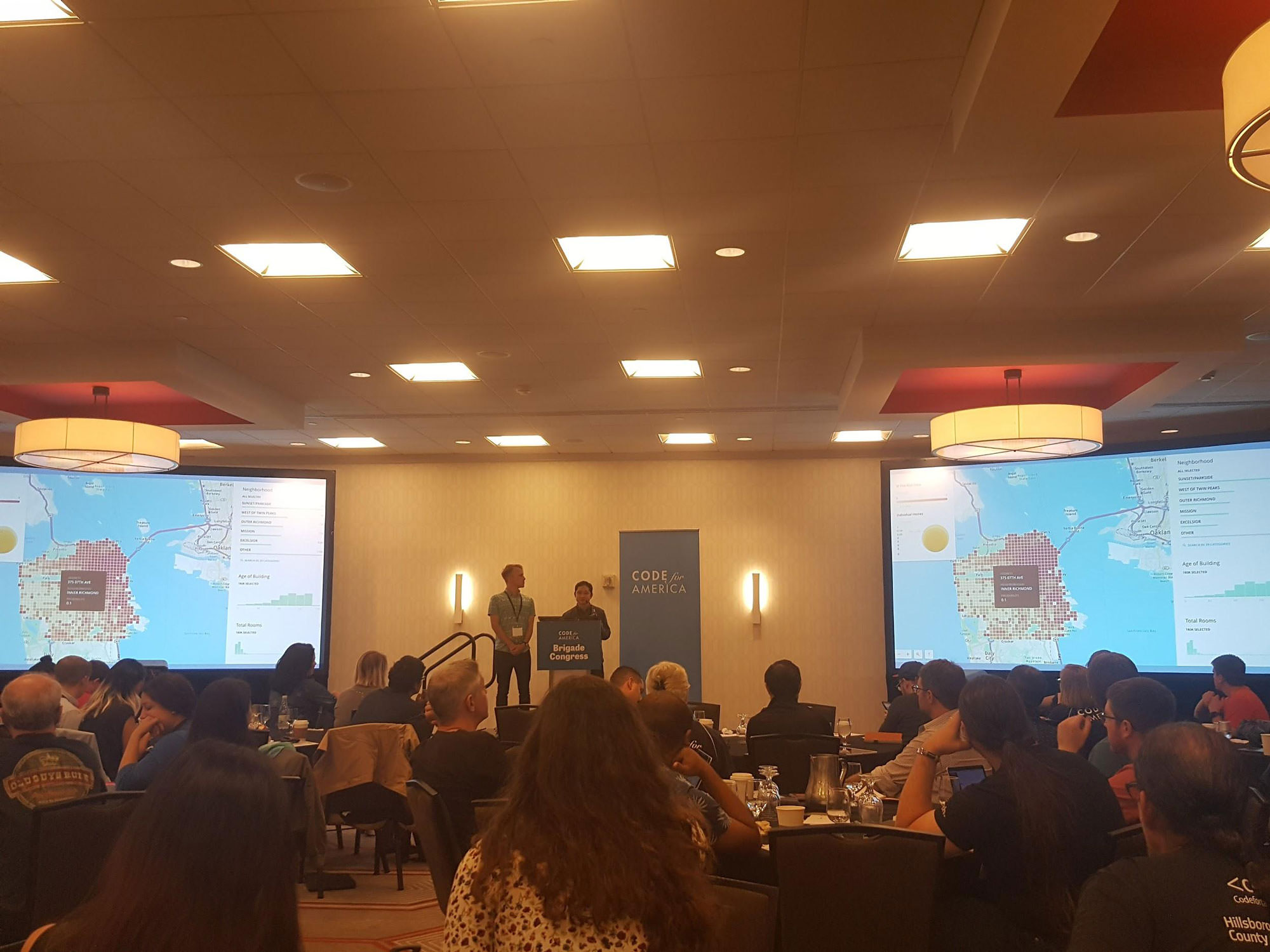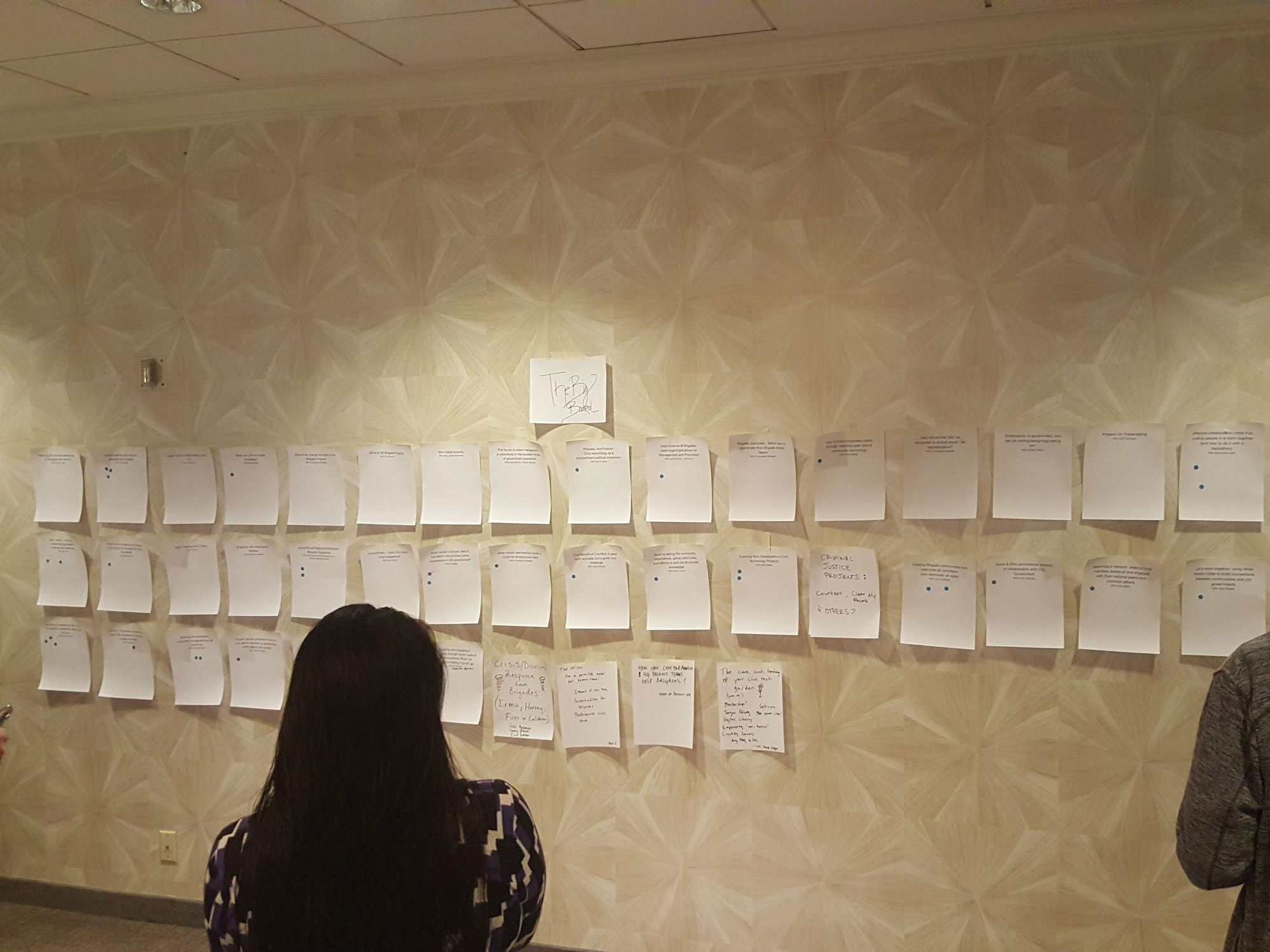Code for America Brigade Congress
Published on by Jude Calvillo, Kenny Durrell, Vincent La
Each member of the SF Brigade contingent (Ryan, Vincent, Jude and I) had a distinct itinerary and a few different modes of transit en route to the Brigade Congress this October but we finally convened at the opening ceremonies, aptly held in a server bay near downtown Philadelphia.
We quickly realized that we were in the company of kindred citizens and government officials. What started as a hum of conversation between friends new and old quickly became a roar. Everyone was so excited to find fellow impassioned technologists and designers that the hosts of the event were hard-pressed to get us to quiet down for a welcome speech.
Amongst the 200-300 attendees were people from every corner of the U.S. and from every level of government. We had in-depth conversations with brigade members from Maine to Hawaii as well as with heads of service design, county data scientists and countless other civil servants. If not for Ryan and my presentation scheduled first thing the next morning, I think I might very well still be at the event. It was an incredible way to start the Congress and a portent of the enthusiastic and productive weekend to come.
The next day, after breakfast, a few icebreakers and inspiring remarks from the founder of Code for America and the Congress organizing committee, came the lightning talks. These highlighted successful projects from a few of the Brigade, including excellent work on promoting diversity in brigades from fellow Bay Area contingent OpenOakland as well as a talk by Ryan and I about the SF Fire Risk prediction model that we and a number of contributors had worked on over the past year.
Then came the unconference voting. I’d never been to an unconference before, but to summarize for the uninitiated: there is no set agenda.
Participants typically submit session ideas ahead of time, although some people had bursts of inspiration and added theirs to the fray that morning. Every session proposer goes up on stage and gives a quick pitch on the content of their session to the entire conference. The proposals are then printed on separate pieces of paper, with a short description, and taped to a wall. Then the attendees clamor to vote for those they’d like to attend by adding stickers to the paper proposals. After the quick voting process, the session with the most votes get reviewed by the conference committee and if there are any overlapping ideas, these sessions are combined and run by co-leaders. Needless to say, it feels very democratic and participatory!
There were 8 sessions over the course of the two days, and Jude and Vincent, of our Code for SF Brigade, were immediately thrust into leading a session on data science principles and best practices as learned from their work with the Data Science Working Group. This unconference session was really awesome. The room was packed; there was a ton of interest in data science out there. We took this opportunity to share what has worked for Code for SF and learn from other brigades what worked for them. It was really awesome to see all the energy and passion for data science out there. A few key highlights from that session:
- Even a “Data Science” Working Group is not strictly data science. With successful projects, The majority of the work is establishing strong partnerships with civic agencies and making sure you’re working towards solving real problems. Furthermore, there’s a ton of work to write good documentation, build solid infrastructure, and establish ETL processes. Fancy “modeling” is only 10% of the battle.
- A key question that came up was “how do we establish those partnerships with government”. At SF, sometimes we take it for granted that we live in an area where data science is such a hot button issue. For example, we asked everyone who lived in a city with a “Chief Data Officer” to raise their hands, and the majority of the room could not. This even further exemplified that it’s important for us to engage with our civic partners and make sure we can communicate the value of data science to solve real world problems
- The Data Science Hippocratic Oath: one extremely intriguing idea that came out was forming some kind of data science “hippocratic oath”. Just as doctors need to take this oath to ensure that they complete their duties with the highest ethical standard, we as data scientists, should also ensure that we take the proper steps to uphold our ethical standards and promote transparency in our work. Furthermore, we should devote our work to help the People and not be swayed by special interests.
Outside of their session, highlights of the first day included:
- An engaging discussion about methods and tools to aid redeployability of Code for America projects
- Strategies employed by brigades to effectively engage with city governments and agencies. Takeaways: meet government employees on their turf and demonstrate value with smaller, successful projects
- A session on how to raise revenue for the brigade and various business models that other brigades have employed. In particular Beta NYC talked about their business models that included teaching Excel classes to city officials, partnering with local universities to take on graduate students in exchange for resources, and finding sponsors for large events.
The first day concluded with dinner and then carried over to a local watering hole, where both the conversation and drinks continued to flow. As the night wore on, many CfAers slowly peeled off and headed back to their hotel while others rallied to keep the evening going. Let’s just say Code for America brigadiers know how to take over a dance floor :)
A half day of sessions the next morning, including a presentation about using hackathons as a method of increasing the diversity and pool of CfA brigade hack night attendees as well as homeless & affordable housing, and we were at the closing remarks.
Jenn Pahlka, the founder of Code for America, spoke of the importance of our work and the necessity for us to continue to hold government officials accountable for delivering equitable, open and user-friendly services to the citizens they serve. As inspiring as her speech was, she emphasized that she was equally as inspired by seeing us working all across the U.S. to make government work for the people. As she ended her speech, a quote displayed on the screen behind her. It captured the weekend’s ethos quite well:
“Efficiency in government is a matter of social justice.”
As the conference came to a close, we assembled the California Brigade representatives for one last picture. An important note that came out of this was that there’s a lot of really great work happening at Open Oakland, Code for San Jose, the newly formed Code for Berkeley, and as far north as Code for Sacramento! We all put together our brigade’s regular meeting times in this google spreadsheet so that we could all better coordinate with each other. As the new year rolls around we’re really hopeful that 2018 brings closer connection between all the California Brigades!
And finally, here’s one last photo of everyone at Independence Hall in Philadelphia, where both the U.S. Declaration of Independence and U.S. Constitution were signed!



